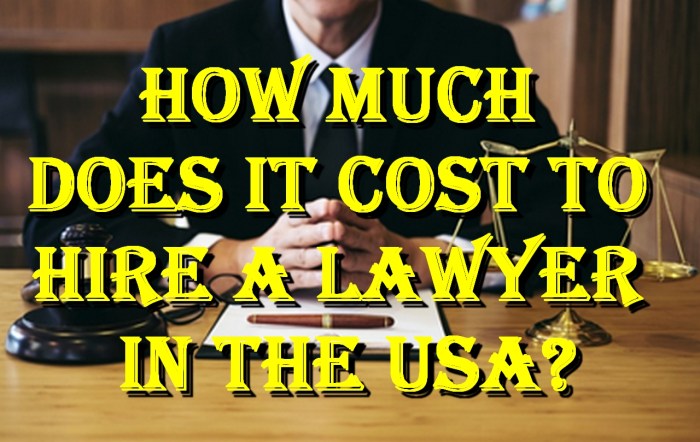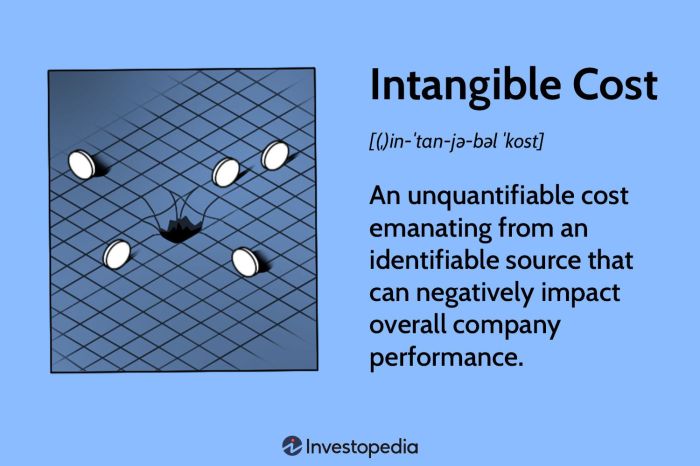What are the intangible costs of hiring a lawyer? It’s a question that many businesses and individuals ask themselves when they’re faced with a legal issue. While the financial costs of hiring a lawyer are often easy to quantify, the intangible costs can be much more difficult to assess.
These costs can include things like the loss of time, productivity, and emotional stress. In this article, we’ll discuss the intangible costs of hiring a lawyer and how you can minimize them.
One of the most significant intangible costs of hiring a lawyer is the loss of time. When you’re involved in a legal dispute, you’ll need to spend a lot of time meeting with your lawyer, preparing for hearings, and attending court appearances.
This can take away from your time that you could be spending on your business or personal life.
Loss of Time and Productivity

Hiring a lawyer can significantly impact daily operations and employee productivity. Legal matters often require attention and time, leading to delays or neglect of other tasks.
Tasks Affected by Legal Matters
- Essential business functions like sales, marketing, and customer service may be put on hold while employees attend legal meetings, depositions, or court hearings.
- Employees involved in legal proceedings may experience stress and distraction, affecting their focus and performance.
- Time spent on legal matters reduces the time available for core business activities, potentially hindering progress and revenue generation.
Emotional and Mental Stress
Legal proceedings can be emotionally and mentally taxing, taking a toll on individuals and teams involved. The psychological impact of litigation can manifest in various forms, including anxiety, stress, and emotional distress.
The different stages of litigation can trigger emotional distress. The initial filing of a lawsuit, the discovery process, trial preparation, and the trial itself can all be highly stressful experiences. Each stage brings its unique challenges and uncertainties, contributing to the overall emotional burden.
Specific Legal Proceedings
Certain legal proceedings are particularly notorious for causing significant emotional stress. Family law matters, such as divorce and child custody disputes, often involve highly personal and emotionally charged issues. Criminal trials, especially those involving serious crimes, can be incredibly stressful for both the accused and their families.
Coping Mechanisms and Resources
To manage the emotional stress of litigation, individuals can employ various coping mechanisms. Seeking support from family and friends, engaging in stress-reducing activities like exercise or meditation, and practicing self-care techniques can help alleviate anxiety and promote emotional well-being.
Professional help can also be invaluable. Therapists and counselors specializing in legal issues can provide guidance, support, and coping strategies tailored to the specific challenges of litigation.
Damage to Reputation
Hiring a lawyer can pose significant reputational risks, especially in sensitive cases. The mere association with legal proceedings can cast a negative light on a company, damaging its customer perception, public image, and industry standing.
Consequences of Hiring a Lawyer with Unethical Behavior
Companies should exercise caution when hiring lawyers with a history of misconduct or unethical behavior. Such associations can amplify reputational damage, eroding trust and confidence among stakeholders.
Impact of Media Coverage
If a case becomes public or widely reported in the media, the reputational damage can be severe. Negative publicity can spread rapidly, tarnishing the company’s image and deterring potential customers.
Strained Relationships
Legal disputes can cast a shadow over relationships, leaving lasting consequences that extend beyond the courtroom. The adversarial nature of litigation can strain connections with clients, colleagues, and partners.
Conflicts of Interest, What are the intangible costs of hiring a lawyer
Conflicts of interest arise when a lawyer represents multiple parties with potentially conflicting interests. This can create a difficult situation where the lawyer must balance the needs of each client while maintaining confidentiality. Breaches of confidentiality can erode trust and damage relationships.
Strained Communication
Legal disputes can disrupt communication channels, leading to misunderstandings and resentment. The formal and adversarial nature of legal proceedings can make it difficult for parties to engage in open and honest conversations. This strained communication can damage relationships and hinder conflict resolution.
Impact on Trust, Loyalty, and Respect
Legal disputes can shatter trust, loyalty, and respect. When individuals or organizations are involved in a legal battle, it can be difficult to maintain positive relationships. The adversarial process can foster suspicion, mistrust, and a sense of betrayal.
Strategies for Mitigation
To mitigate the negative effects of legal disputes on relationships, consider the following strategies:
- Prioritize open and honest communication.
- Explore alternative dispute resolution methods like mediation or negotiation.
- Maintain confidentiality and avoid conflicts of interest.
- Foster a respectful and professional demeanor throughout the legal process.
Role of Mediation and Negotiation
Mediation and negotiation offer alternative paths to resolving legal disputes without resorting to adversarial litigation. These methods prioritize communication, collaboration, and compromise. By engaging in these processes, parties can preserve relationships while finding mutually acceptable solutions.
Ethical Implications
Legal disputes carry significant ethical implications. Lawyers have a duty to maintain integrity and avoid conflicts of interest. They must balance the need for zealous representation with the preservation of relationships and the pursuit of justice.
Opportunity Cost
Hiring a lawyer can divert resources from other business priorities, resulting in missed opportunities or delayed growth. Quantifying these opportunity costs is crucial to understand the true financial impact of legal expenses.
Calculating Opportunity Cost
The opportunity cost of hiring a lawyer can be calculated by considering the value of the resources diverted from other business activities. This includes:
- Time spent by key personnel on legal matters
- Funds diverted from investment or expansion plans
- Resources allocated to compliance and litigation
Potential Impact of Missed Opportunities
Missed opportunities or delayed growth due to legal expenses can have a significant financial impact on a business. For example, a company may miss out on a lucrative contract or investment opportunity while resources are tied up in legal proceedings.
The lost revenue and potential growth from these missed opportunities can be substantial.
Table: Opportunity Costs of Hiring a Lawyer
| Cost Category | Description | Potential Impact ||—|—|—|| Time | Time spent by key personnel on legal matters | Reduced productivity, missed deadlines || Funds | Funds diverted from investment or expansion plans | Delayed growth, reduced profitability || Resources | Resources allocated to compliance and litigation | Increased operational costs, reduced efficiency |
Administrative Burden
Hiring a lawyer entails various administrative tasks that can be time-consuming and demanding. These tasks include:
- Document gathering:Collecting and organizing relevant documents such as contracts, financial statements, and correspondence.
- Correspondence management:Communicating with the lawyer via email, phone, or in person to exchange information and updates.
- Appointment scheduling:Coordinating meetings, hearings, and other appointments with the lawyer and other parties involved.
- Document filing:Maintaining and filing legal documents, including pleadings, motions, and court orders.
- Expense tracking:Recording and submitting expenses incurred during the legal process, such as court fees and expert witness costs.
These administrative tasks can divert attention away from core business operations and can be a significant burden for individuals or organizations with limited resources or time.
Loss of Control
Hiring a lawyer can lead to a loss of control over legal matters due to the complexities of the law, the need for specialized knowledge, and the attorney-client relationship. Understanding the potential loss of control is crucial for clients considering legal representation.
The attorney-client relationship is a fiduciary relationship based on trust and confidence. The lawyer has a duty to provide competent representation and protect the client’s interests. However, this duty can sometimes conflict with the client’s personal values or goals.
For example, a lawyer may advise a client to plead guilty to a crime to avoid a more severe sentence, even if the client maintains their innocence. While the lawyer’s advice may be sound from a legal standpoint, it may not align with the client’s moral or ethical beliefs.
To mitigate the loss of control, clients should be actively involved in their legal matters. They should communicate their goals and values to their lawyer and be prepared to make decisions based on the lawyer’s advice.
Ultimately, the decision of whether to hire a lawyer is a personal one. Clients should weigh the benefits of legal representation against the potential loss of control before making a decision.
Factors to Consider When Hiring a Lawyer
- The complexity of the legal issue
- The client’s financial resources
- The client’s personal values and goals
- The lawyer’s experience and reputation
- The attorney-client relationship
Tips for Maintaining Control While Working with a Lawyer
- Be clear about your goals and values.
- Communicate regularly with your lawyer.
- Ask questions and seek clarification.
- Be prepared to make decisions.
- Trust your instincts.
Uncertainty and Risk
Legal proceedings inherently involve uncertainty and risk. The outcome of a case is often unpredictable, and even the most seemingly straightforward cases can take unexpected turns. This uncertainty can be a major source of stress for individuals and businesses alike, and it can also have a significant financial impact.
There are a number of potential risks associated with legal disputes. These risks include:
- Unfavorable outcomes:There is always the possibility that you will lose your case, even if you believe you have a strong case. This can result in significant financial losses, as well as damage to your reputation.
- Financial setbacks:Legal disputes can be very expensive, even if you ultimately win your case. The costs of legal fees, court costs, and other expenses can quickly add up, and they can put a strain on your finances.
- Reputational damage:A legal dispute can damage your reputation, even if you are ultimately found not liable. The mere fact of being involved in a lawsuit can make you look bad in the eyes of potential customers, clients, or investors.
The probability and magnitude of these risks can vary depending on the nature of the case. However, it is important to be aware of these risks before you decide whether to pursue legal action.
There are a number of strategies that you can use to mitigate risk and manage uncertainty in legal disputes. These strategies include:
- Alternative dispute resolution (ADR):ADR is a process of resolving disputes outside of court. ADR methods such as mediation and arbitration can be less expensive and less time-consuming than litigation, and they can also help to preserve relationships.
- Insurance:Insurance can help to protect you from the financial risks of legal disputes. There are a number of different types of insurance that can provide coverage for legal expenses, including liability insurance, professional liability insurance, and directors and officers insurance.
By understanding the risks involved in legal disputes and taking steps to mitigate those risks, you can increase your chances of achieving a favorable outcome.
Impact on Morale
Legal disputes can have a significant impact on employee morale and the workplace atmosphere. When employees are aware of or involved in a legal dispute, it can create a sense of uncertainty, anxiety, and stress. This can lead to decreased motivation, reduced productivity, and increased turnover.
Examples of Legal Disputes Impacting Morale
- A sexual harassment lawsuit can create a hostile and uncomfortable work environment, leading to decreased morale and productivity.
- A wrongful termination lawsuit can make employees feel insecure about their jobs, leading to decreased motivation and increased turnover.
- A discrimination lawsuit can create a sense of division and distrust within the workplace, leading to decreased morale and productivity.
Financial Burden

Hiring a lawyer involves substantial financial commitments. Understanding the potential costs is crucial to make informed decisions about legal representation.
The direct financial costs include:
- Legal fees:Attorneys charge fees for their time, expertise, and services rendered. These fees vary based on factors such as experience, location, and the complexity of the case.
- Court expenses:These cover filing fees, service of process, expert witness fees, and other costs associated with legal proceedings.
- Expert witness fees:Experts may be hired to provide testimony or opinions on specific matters related to the case, and their fees can be significant.
Hidden Costs and Unexpected Expenses
Beyond the direct costs, there are potential hidden costs and unexpected expenses to consider. These may include:
- Travel and accommodation expenses:If the case requires travel or overnight stays, these costs can add up.
- Administrative fees:Some law firms charge administrative fees for tasks such as photocopying, postage, and other overhead expenses.
- Unforeseen expenses:Litigation can be unpredictable, and unexpected expenses may arise, such as the need for additional expert witnesses or court appearances.
Time-to-Resolution

Litigation is inherently time-consuming, and the duration of legal proceedings can vary significantly depending on the complexity of the case, the court’s schedule, and the availability of resources. This can have a significant impact on business operations and strategic planning.
Potential Delays and Timeframes
The time it takes to resolve a legal dispute can range from a few months to several years. In some cases, litigation may even be stayed or dismissed due to unforeseen circumstances or procedural delays. This uncertainty can make it difficult for businesses to plan for the future and can lead to missed opportunities or financial losses.
Impact on Innovation: What Are The Intangible Costs Of Hiring A Lawyer

Legal disputes can significantly hinder innovation and creativity within organizations. The fear of legal consequences can stifle risk-taking and new product development. Organizations may become overly cautious in their decision-making, avoiding potentially innovative ideas that could lead to legal challenges.
This can lead to a culture of risk aversion, where new ideas are not explored due to the potential for legal liability.
Fear of Legal Consequences
The fear of legal consequences can have a chilling effect on innovation. Organizations may be reluctant to invest in new technologies or products if they are concerned about potential patent infringement or other legal issues. This can lead to a lack of diversity in the marketplace, as organizations are less likely to take risks and develop new products that could potentially disrupt existing markets.
Compliance Burden
Hiring a lawyer often entails additional compliance requirements and regulations. These can include increased paperwork, reporting, and legal audits.
- Paperwork:Lawyers may require extensive documentation, such as contracts, agreements, and legal disclosures, to comply with regulatory requirements.
- Reporting:Certain industries or legal matters may necessitate regular reporting to government agencies or regulatory bodies, adding to the administrative burden.
- Legal Audits:Lawyers may conduct legal audits to ensure compliance with applicable laws and regulations, which can be time-consuming and resource-intensive.
Legal Complexity
The legal system is a complex and intricate web of laws, regulations, and precedents. Navigating this system can be a daunting task, even for those with legal training. For those without legal expertise, the challenges can be even greater.
One of the most significant challenges of legal complexity is the use of specialized knowledge and legal jargon. Legal documents are often filled with terms and phrases that are unfamiliar to the average person. This can make it difficult to understand the meaning of these documents and to make informed decisions about legal matters.
Understanding Legal Documents
To overcome the challenge of legal complexity, it is important to have a basic understanding of legal documents. Here are a few tips for understanding legal documents:
- Read the document carefully.Don’t skim over the document or skip sections that you don’t understand. Take your time and read the document thoroughly.
- Identify the key terms and phrases.These are the terms that are most important to understanding the meaning of the document. Look for terms that are defined in the document or that are used in a specific way.
- Don’t be afraid to ask for help.If you don’t understand something in a legal document, don’t hesitate to ask for help from a lawyer or other legal professional.
Common Legal Challenges
In addition to the challenge of understanding legal documents, there are a number of other common legal challenges that individuals may face. These challenges include:
- Dealing with government agencies.Government agencies often have complex rules and regulations that can be difficult to understand and comply with.
- Resolving disputes.Disputes can arise in a variety of contexts, including business, family, and personal relationships. Resolving disputes can be a complex and time-consuming process.
- Protecting your rights.It is important to know your legal rights and how to protect them. This includes knowing when to seek legal advice and how to assert your rights in court.
Overcoming Legal Challenges
Overcoming legal challenges can be difficult, but it is possible with the right help and resources. Here are a few tips for overcoming legal challenges:
- Get legal advice.If you are facing a legal challenge, it is important to get legal advice from a lawyer or other legal professional. A lawyer can help you understand your legal rights and options and can represent you in court.
- Do your research.Before you make any decisions about your legal challenge, do your research and learn as much as you can about the law. This will help you make informed decisions and avoid costly mistakes.
- Be persistent.Overcoming legal challenges can take time and effort. Don’t give up if you don’t get the results you want right away. Be persistent and keep fighting for your rights.
Impact on Business Relationships
Legal disputes can have a profound impact on business relationships, causing strain and disruption that can be difficult to overcome.One of the most significant consequences is the potential for strained communication. When a legal dispute arises, parties may become guarded and less willing to engage in open and honest dialogue.
This can lead to misunderstandings, missed opportunities, and further escalation of the conflict.Another major concern is the damage to trust that can occur during a legal dispute. When parties feel that they have been wronged or deceived, it can be difficult to rebuild the trust that is essential for a healthy business relationship.
This can lead to lost business opportunities, as customers and partners may be hesitant to work with a company that they perceive as untrustworthy.
Outcome Summary

Hiring a lawyer can be a stressful experience, but it doesn’t have to be. By understanding the intangible costs of hiring a lawyer, you can make informed decisions about how to proceed with your case. If you’re facing a legal issue, don’t hesitate to contact a lawyer to discuss your options.
Essential Questionnaire
What are the intangible costs of hiring a lawyer?
The intangible costs of hiring a lawyer can include the loss of time, productivity, and emotional stress.
How can I minimize the intangible costs of hiring a lawyer?
You can minimize the intangible costs of hiring a lawyer by choosing a lawyer who is experienced and efficient, and by being prepared for the legal process.
What are the benefits of hiring a lawyer?
Hiring a lawyer can help you to protect your rights, resolve legal disputes, and achieve your legal goals.